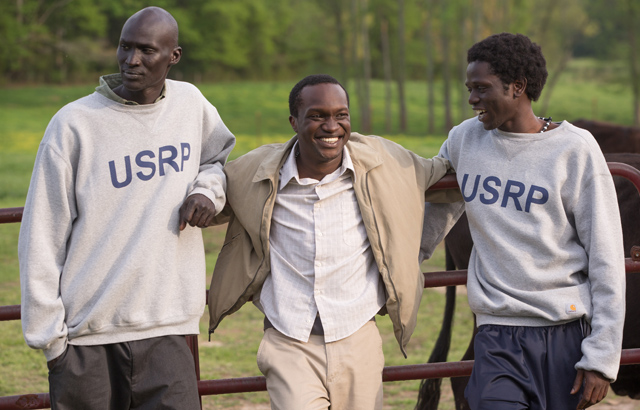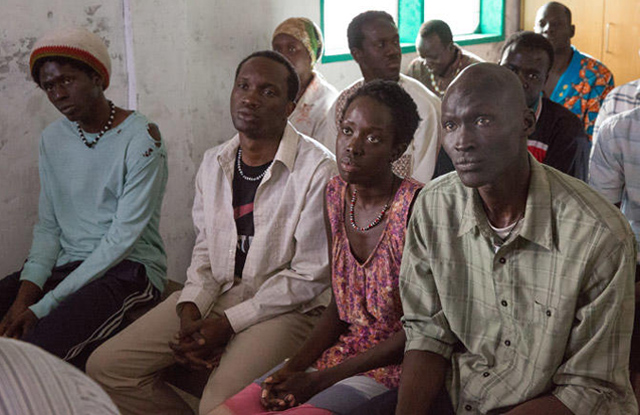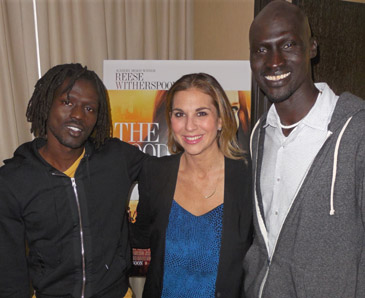CHICAGO – Patrick McDonald of HollywoodChicago.com appears on “The Morning Mess” with Dan Baker on WBGR-FM (Monroe, Wisconsin) on March 21st, 2024, reviewing the new streaming series “Manhunt” – based on the bestseller by James L. Swanson – currently streaming on Apple TV+.
Interview: Producer, Actors of ‘The Good Lie’ Tell Us the Truth
CHICAGO – “The Good Lie” is a honorable film overview of the Sudanese “Lost Boys,” who were refugees from a horrific civil war in that African country. Many of those boys came to America, and producer Molly Smith (“The Blind Side”), with actors Ger Duany and Emmanuel Jal, were part of the team that brought the film to life.

Ger Duany, Arnold Oceng and Emmanuel Jal in ‘The Good Lie’
Photo credit: Warner Bros.
The feature film is inspired by many stories of survival, both in Sudan and America. Jal and Duany portray the adult refugees, trying to make it in America, where everything is different. Reese Witherspoon also stars as a facilitator for these newborns to the U.S., and gives a passionate performance without overshadowing the main story of the boy’s plight. Producer Molly Smith is used to interpreting these stories of inspiration, as she previously was Executive Producer for the hit film “The Blind Side.”
Ger Duany made an amazing debut in “I Heart Huckabees,” and this is his fifth film. Emmanuel Jal – a child soldier in Sudan when he was a Lost Boy – is now an internationally known hip-hop artist, who uses his songs as a bridge to peace and harmony. The producer and two performers of “The Good Lie” sat for an interview with HollywoodChicago.com and told of their experiences and emotions in regard to living and relating this illuminating story.
HollywoodChicago.com: Ger and Emmanuel, we saw examples of what your characters went through when they first came to America. What stories do you both remember as examples of what you had to go through when you first came to America, and how weird it was?
Ger Duany: I came to America in 1994, and I landed at JFK Airport in New York City from Kenya. When I got to New York, I never had seen a city so lighted up that you couldn’t see the stars in the sky. I was just amazed with everything, the movement of the people, how fast they seemed to go. What my character experienced in the film was very close to what I experienced.
Emmanuel Jal: My experience was different, I was smuggled to Kenya by a British aid worker, and was disarmed at that point as a child solider. What was fascinating for me was how fancy everything was. For example, I was given a piece of soap that smelled like pineapple, so I ate it. [laughs] Another thing that was fascinating to me were toilets, the flushing toilets. I couldn’t get used how it worked, I would sit there and think a snake would come up from the water. I thought about that for awhile, but now I trust the toilet.
HollywoodChicago.com: Molly, what was the impetus and origin of getting French director Phillippe Falardeau to direct his first English language film, and why was he the right choice for this subject matter?
Molly Smith: I had seen his film ‘Monsieur Lazhar’ and I was blown away with the tough subject matter he tackled in that film, and how beautiful and poignant his storytelling was. We met all kind of directors for this project, and it was his agent that called and said he wanted to give us five minutes about the project, and would fly in at his own expense.
Phillippe told us he had tried to do a documentary in the Sudan in the 1990s, and was run out. He felt that this was his mission, his way to give back to southern Sudan. I loved that passion, and I also felt that Margaret Nagle’s screenplay was half art film and half ‘Coming to America.’ I knew that Phillippe would tell it with a delicate hand, because Margaret’s screenplay was complete. The key was tone, and I felt if he could nail that and make it one film, then he was going to be gold.

Ger Duany (right) and Emmanuel Jal (far left) Adjust Their Characters to America in ‘The Good Lie’
Photo credit: Warner Bros.
HollywoodChicago.com: Emmanuel and Jai, how did you both want to honor your past as Sudanese citizens and ‘Lost Boys’ in your performance, and how did it honor the Sudanese who didn’t make it through the civil war?
Jal: We had to keep ourselves as real as possible and be the voices of those who are not here, be the voices of the dead. In the past, I’ve shared my story through my music and books, and now there is this movie, which has given us the opportunity to shine a spotlight on the story. Because I believe when you put a spotlight in a dark place, the evil perform less. When a human being is knows what is in the light, you don’t have to tell them to do something about it, they will just do it. It’s about letting them know.
Duany: Most importantly, we came from the generation that was lost in war. And to define that, there are several layers. The Sudan has been going through civil war since 1955, and is still going on as of today. Many people around the world have many questions, which have never been answered by the Sudanese.
To do a film like this, that sat right in our laps, gives us the responsibility to tell the story of the two Sudans, and what is really happening, this place where 4 million people have died. For us to survive, that responsibility of telling our story belongs to us and our people, but if I define Sudan it is a country that is hopeful.
HollywoodChicago.com: Molly, how did the production team, in partnership with screenwriter Margaret Nagle, deal with the question of making the film too Americanized, as in making sure that the story doesn’t just focus on the ‘rescue’ from American white folks?
Smith: Therein lies the reason the script wasn’t made for ten years. Many studio executives told Margaret to tell it from the Reese Witherspoon character, and do it in flashback. When my partners and I got it, it was perfect timing, because we were starting a new independent film company. What I loved about is the way she told it, and I thought if we could find the right tone, everything else would fall into place, because it felt real. What everyone else rejected, I thought made the film unique.
HollywoodChicago.com: Now the you both know the origins of the war that caused so much pain to you and your families, who or what are most angers you about the conflict, and how do you think it could have been avoided?
Duany: You can’t point fingers at one person. We are actors, and art is our way to go forward. We don’t want anyone to feel sorry for us, we are here, and we have a long journey ahead. We understand that the world has problems, and after this movie will will begin another struggle ahead of us, and we are prepared.
Jal: In my perspective, when I was trained as a child soldier, I was trained to hate Muslims and Arabs. My plan at the time was to kill as many Muslims and Arabs as possible. So my understanding about the war now is that it took away my family, destroyed everything, stole love and peace. When i got an opportunity to escape, all my hatred fell away, and my understanding changed, and I discovered the truth. What was killing us were not Muslims and Arabs, it was the colonies. People will extend their empathy to others with the same faith and the same color, and exploit the other.
I don’t have anybody to hate, sometimes I wake up in the morning and wonder, ‘who can I hate?’ [laughs] It’s hard to understand, but there must be reason that this has happened to me. I am for peace. Peace is justice, equality and freedom for all. Peace is food in my belly. Peace is creating opportunities. Refugees run to other countries because they see the beauty and possibility of it, and that is peace.
HollywoodChicago.com: Molly, What fascinates you about the circumstances of poor outsiders getting another chance through interaction with unlikely sources, since that was the theme of both this film and ‘The Blind Side’?
 Emmanuel Jal, Molly Smith and Ger Duany in Chicago Photo credit: Patrick McDonald for HollywoodChicago.com |
Smith: It comes down to stories that inspire me. I remember reading both screenplays, my first reading of each, and I think it’s the inspiration and the perseverance in both stories. I had the unique experience to know about ‘The Lost Boys’ before I encountered this story, one of them became my family’s adopted brother and my parents helped him through school. He’s now a PhD engineer in Memphis, and I love him. He’s part of my family. I knew how amazing the Lost Boys were in general – what they went through, how they persevered, and how they give back – that to me was the motivation to tell this story.
HollywoodChicago.com: Emmanuel, what song do you perform that encompasses your whole life, that communicates to the audience what you pain was, and now what your optimism is for world peace?
Jal: Each song that I do communicates that differently. There is one song, ‘Forced to Sin,’ tells of my childhood. I have another song called ‘Emma,’ about the British aid worker that rescued me. And now, there are two songs on the soundtrack of the movie, one is ‘We Fall, We Get Up’ and one called ‘Scars.’ Every song has a moment as to why I am. I also have a new album called ‘The Key.’
HollywoodChicago.com: Ger, you grew up in Bloomington, Indiana, and I attended college there at Indiana University. What do you find most American about that particular city?
Duany: Bloomington taught me how to become a child again. I defined myself as a teenager there. My uncle was a professor at Indiana University, and they welcomed me there. It was America for me.
 | By PATRICK McDONALD |


